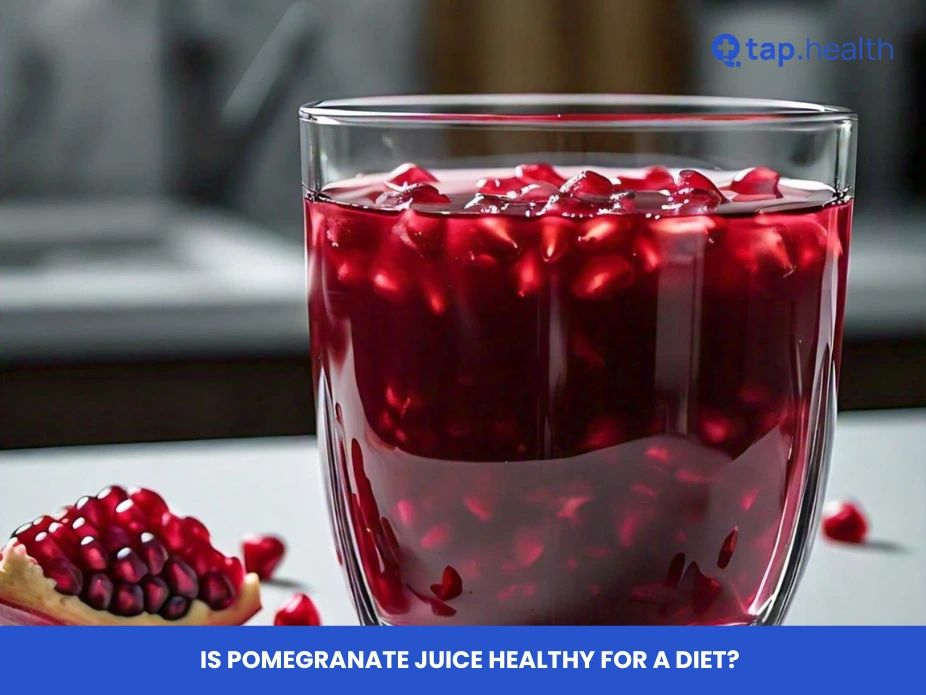Maintaining a healthy diet is essential for overall well-being, and many people seek nutritious beverages to complement their eating habits. Pomegranate juice has gained popularity as a flavorful and healthful option. But is pomegranate juice healthy for a diet? In this article, we’ll explore the benefits and considerations of incorporating pomegranate juice into your diet, backed by expert opinions and scientific research.
Understanding Pomegranate Juice
Before diving into its dietary benefits, let’s understand what pomegranate juice is and what makes it special.
What is Pomegranate Juice?
Pomegranate juice is extracted from the seeds (arils) of the pomegranate fruit (Punica granatum). Known for its deep red color and sweet-tart flavor, pomegranate juice is not only delicious but also packed with essential nutrients and antioxidants.
Nutritional Profile of Pomegranate Juice
- Vitamins: High in Vitamin C, Vitamin K, and several B vitamins.
- Minerals: Contains potassium, folate, and magnesium.
- Antioxidants: Rich in polyphenols, tannins, and anthocyanins that help fight free radicals.
- Calories: Approximately 134 calories per cup (240 ml), primarily from natural sugars.
- Fiber: Contains dietary fiber, aiding in digestion.
Is Pomegranate Juice Healthy for a Diet?
The answer is yes, but with moderation. Pomegranate juice offers numerous health benefits that can support a healthy diet, but it’s important to be mindful of its sugar and calorie content. Let’s explore how pomegranate juice can be beneficial and what to watch out for.
Also read this – is pomegranate juice good for high blood pressure
Potential Benefits of Pomegranate Juice for a Diet
- Rich in Antioxidants:
- Pomegranate juice is loaded with antioxidants like polyphenols and anthocyanins. These compounds help reduce oxidative stress and inflammation in the body, supporting overall health and potentially aiding in weight management.
- Supports Heart Health:
- Regular consumption of pomegranate juice has been linked to improved heart health. It can help lower blood pressure, reduce bad cholesterol (LDL), and increase good cholesterol (HDL), reducing the risk of heart disease.
- Aids in Weight Management:
- Pomegranate juice can be a satisfying and nutritious addition to a weight loss diet. Its natural sweetness can help curb sugar cravings, and the fiber content aids in digestion and promotes a feeling of fullness.
- Enhances Exercise Performance:
- The antioxidants in pomegranate juice may improve exercise performance by reducing muscle soreness and increasing endurance. This makes it a great post-workout drink.
- Boosts Immune System:
- High in Vitamin C, pomegranate juice strengthens the immune system, helping the body fight off infections and illnesses more effectively.
- Improves Digestion:
- The fiber and natural enzymes in pomegranate juice aid in digestion, preventing constipation and promoting a healthy digestive system.
- Anti-Inflammatory Properties:
- Chronic inflammation is linked to various health issues, including obesity and metabolic syndrome. Pomegranate juice’s anti-inflammatory effects can help mitigate these risks.
Considerations and Potential Drawbacks
- High Sugar Content:
- Pomegranate juice contains natural sugars, which can contribute to increased calorie intake. For those monitoring their sugar intake, such as individuals with diabetes, it’s important to consume pomegranate juice in moderation.
- Caloric Intake:
- With approximately 134 calories per cup, drinking large amounts of pomegranate juice can lead to unwanted weight gain. It’s essential to balance juice consumption with other low-calorie, nutrient-dense foods.
- Potential Medication Interactions:
- Pomegranate juice can interact with certain medications, including blood thinners and cholesterol-lowering drugs. If you’re on medication, consult your healthcare provider before adding pomegranate juice to your diet.
- Acidity:
- The acidic nature of pomegranate juice might cause stomach upset in some individuals, especially if consumed on an empty stomach. Diluting the juice with water can help reduce acidity.
- Allergic Reactions:
- Although rare, some people may be allergic to pomegranates. Symptoms can include itching, swelling, dizziness, and difficulty breathing. If you experience any of these symptoms, seek medical attention immediately.
Expert Opinions on Pomegranate Juice and Diet
Dr. Laura Martinez, Nutritionist
“Pomegranate juice is a fantastic addition to a balanced diet due to its high antioxidant content and essential nutrients. However, it’s important to consume it in moderation to avoid excess sugar intake, especially for those managing their weight or blood sugar levels.”
Dr. James Thompson, Cardiologist
“Pomegranate juice has significant benefits for heart health, including lowering blood pressure and improving cholesterol levels. Its anti-inflammatory properties also contribute to overall cardiovascular health. Patients should enjoy it as part of a heart-healthy diet while being mindful of portion sizes.”
Research Findings
A study published in the American Journal of Clinical Nutrition found that regular consumption of pomegranate juice can lead to a significant reduction in blood pressure and improved lipid profiles. Another study in the Journal of Medicinal Food highlighted pomegranate juice’s role in reducing inflammation and oxidative stress, which are critical factors in chronic disease management.
How to Incorporate Pomegranate Juice into Your Diet Safely
If you’re considering adding pomegranate juice to your diet, here are some tips to do so safely and effectively:
1. Moderation is Key
Limit your intake to about 4 ounces (120 ml) per day. This amount provides the benefits without excessive sugar or calorie intake.
2. Choose 100% Pure Pomegranate Juice
Opt for 100% pure pomegranate juice without added sugars or artificial flavors. This ensures you’re getting the maximum nutritional benefits without unnecessary additives.
3. Dilute the Juice
If you find pomegranate juice too sweet or acidic, dilute it with water or mix it with other low-sugar juices like apple or cranberry juice. This can help reduce the overall sugar content while still providing flavor and nutrients.
4. Combine with a Balanced Diet
Incorporate pomegranate juice as part of a balanced diet rich in fruits, vegetables, whole grains, lean proteins, and healthy fats. This holistic approach supports overall health and effective weight management.
5. Monitor Your Body’s Response
Pay close attention to how your body reacts after consuming pomegranate juice. If you experience any discomfort, reduce the amount or discontinue use and consult your healthcare provider.
6. Pair with Other Healthy Foods
Combine pomegranate juice with foods known to support a healthy diet, such as leafy greens, nuts, seeds, and whole grains. This enhances the overall nutritional value of your meals.
7. Use in Recipes
Incorporate pomegranate juice into various recipes to enjoy its benefits in different forms:
- Smoothies: Blend pomegranate juice with fruits and vegetables for a nutritious smoothie.
- Salad Dressings: Use pomegranate juice as a base for homemade salad dressings.
- Marinades: Incorporate pomegranate juice into marinades for meats and vegetables.
- Desserts: Use it in yogurt parfaits, popsicles, or as a topping for desserts.
Alternative Healthy Beverages
While pomegranate juice is a great option, there are other healthy beverages you can include in your diet:
- Green Tea: Rich in antioxidants and can boost metabolism.
- Water: Essential for hydration and overall health.
- Herbal Teas: Such as chamomile or peppermint, which can aid in digestion and relaxation.
- Vegetable Juices: Like carrot or beet juice, which are low in sugar and high in nutrients.
- Coconut Water: A natural source of electrolytes and hydration.
Lifestyle Changes to Support a Healthy Diet
In addition to incorporating pomegranate juice, adopting healthy lifestyle habits can enhance your diet’s effectiveness:
- Regular Exercise: Engaging in physical activity helps burn calories, build muscle, and improve cardiovascular health.
- Adequate Sleep: Ensuring you get enough rest supports metabolism and overall health.
- Stress Management: Practices like meditation, yoga, or deep breathing can help reduce stress, which can impact eating habits and weight.
- Mindful Eating: Paying attention to what and how you eat can prevent overeating and promote healthier food choices.
- Stay Hydrated: Drinking plenty of water throughout the day supports digestion and overall bodily functions.
Potential Risks of Ignoring Dietary Considerations
Ignoring the considerations associated with pomegranate juice can lead to potential health issues:
- Weight Gain: Excessive sugar and calorie intake can contribute to unwanted weight gain.
- Blood Sugar Spikes: High sugar content can affect blood sugar levels, especially for individuals with diabetes.
- Digestive Issues: Consuming too much juice can lead to stomach upset or diarrhea.
- Medication Interactions: Ignoring potential interactions can reduce the effectiveness of medications or cause adverse effects.
Always balance pomegranate juice consumption with other dietary choices and consult with a healthcare provider if you have any health concerns.
Key Takeaways:
- Antioxidant-Rich: Pomegranate juice is packed with antioxidants that help reduce inflammation and oxidative stress.
- Heart Health: Supports blood pressure regulation and cholesterol balance.
- Weight Management: Can aid in weight loss efforts when consumed in moderation.
- Hydration and Energy: Contributes to hydration and provides a natural energy boost.
- Moderation: Essential to avoid excess sugar and calorie intake.
- Consult Healthcare Providers: Especially important if you have underlying health conditions or are on medications.
Incorporate pomegranate juice thoughtfully into your diet to enjoy its health benefits while maintaining a balanced and nutritious eating plan.
Frequently Asked Questions (FAQ)
1. Can pomegranate juice help with weight loss?
Yes, pomegranate juice can aid in weight loss by providing antioxidants, promoting satiety, and reducing sugar cravings. However, it’s important to consume it in moderation to avoid excess calorie and sugar intake.
2. How much pomegranate juice should I drink daily for health benefits?
A recommended amount is about 4 ounces (120 ml) per day. This provides health benefits without excessive sugar or calorie intake. Always consult your healthcare provider for personalized advice.
3. Is pomegranate juice better than other fruit juices for a diet?
Pomegranate juice is high in antioxidants and vitamins, making it a nutritious choice. However, it is also higher in sugar compared to some other juices like cranberry or vegetable-based juices. Choosing 100% pure pomegranate juice without added sugars is essential.
4. Can pomegranate juice interact with medications?
Yes, pomegranate juice can interact with certain medications, including blood thinners and cholesterol-lowering drugs. Consult your healthcare provider before adding it to your diet if you are on medication.
5. Is fresh pomegranate juice better than bottled juice?
Yes, fresh pomegranate juice is generally better as it contains no added sugars or preservatives, making it a healthier option. If fresh juice isn’t available, choose pure bottled pomegranate juice without additives.
6. Can pomegranate juice improve heart health?
Yes, pomegranate juice can improve heart health by lowering blood pressure, reducing bad cholesterol levels, and decreasing inflammation, all of which contribute to a healthier cardiovascular system.
7. Is pomegranate juice safe for diabetics?
Pomegranate juice contains natural sugars, which can affect blood sugar levels. Diabetics should consume it in moderation and monitor their blood sugar closely. It’s best to consult a healthcare provider before adding it to your diet.
8. Can I use pomegranate juice as a meal replacement?
While pomegranate juice is nutritious, it should not be used as a meal replacement. It lacks essential proteins and fats needed for a balanced diet. Use it as a supplement to your meals instead.
9. Does pomegranate juice help with digestion?
Yes, the fiber and natural enzymes in pomegranate juice aid in digestion, helping to prevent constipation and promote a healthy digestive system.
10. Can pomegranate juice boost my immune system?
Absolutely. Pomegranate juice is high in Vitamin C and other antioxidants that strengthen the immune system, helping the body fight off infections and illnesses more effectively.
References
- Mayo Clinic – Pomegranate Juice: Health Benefits and Nutrition
- Harvard Health Publishing – The Benefits of Pomegranate Juice
- National Institutes of Health (NIH) – Pomegranate Juice and Cardiovascular Health



